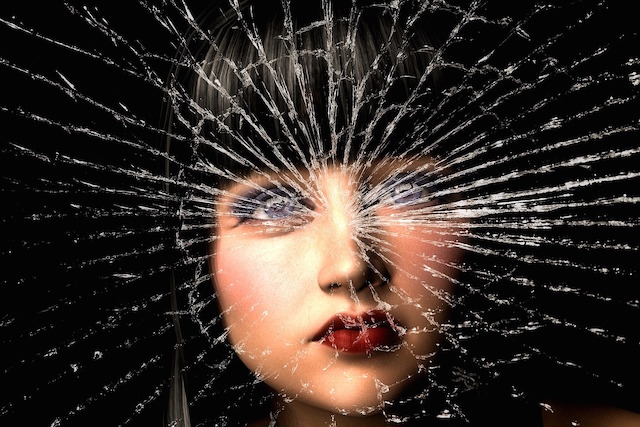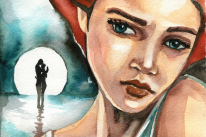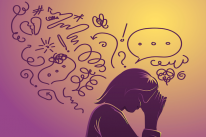
“Life always waits for some crisis to occur before revealing itself at its most brilliant.” ~Paul Coelho
I spent my twenty-fifth birthday crying alone at the foot of a mountain. While I had always found solace in spending time by myself, in that moment, I did not recognize my “self.” Without my self, I had nothing.
I was utterly alone.
Three weeks earlier, a man was shot just feet away from my front door. My then-boyfriend and I performed CPR until an ambulance arrived, but the man had been killed on impact. The police left my home at 3 a.m.; at 7 a.m., I was headed to the airport for a family wedding.
There is no mourning at a wedding.
Forced to paste on a smile, I told myself and everyone around me that I was fine. Never mind the fact that I felt like all of the air had been sucked out of me. If you tell a lie enough times, you start to believe it yourself.
For weeks, I assured myself that I was strong enough to bear the heavy burden of witnessing a violent crime. I always identified as a strong, independent woman. I couldn’t let go of that, I felt, or I might not ever get it back.
But as the days passed, I started to realize that something was different. The girl who was known for her constant zest for life and naturally cheerful demeanor was replaced by a woman who was exhausted, short-tempered and—it took me weeks to realize—depressed.
When the truth finally broke free, I was overwhelmed. Sitting there, at the base of my favorite Phoenix mountain, all I could think was, “I am not okay.”
In that moment, I was not okay.
But the truth has a funny way of setting you free. Faced with a sensation that was completely foreign and extremely uncomfortable to me—the idea that I was more vulnerable than I wanted to believe—I finally saw a glimmer of light.
Only in honoring my emotions was I able to let them go.
After crying myself weak, I climbed that mountain. As I reached the top, I inhaled deeply and felt my breath for the first time in weeks. The tears that flowed at the top were entirely different: they were tears of gratitude.
The moment that I learned to allow myself to be “not okay” was a turning point in my adult life.
To allow yourself to feel is to allow yourself to really live.
Once I was able to look at my emotions honestly, I was able to look at my life honestly and to realize that I did, in fact, want to participate wholly in it. I appreciated life more deeply than ever before.
Months later, when my dear friend lost her dear friend, I shared my secret: “It’s okay to be not okay.” Amidst all of the sympathetic wishes and “it will get betters,” that message resonated most deeply. Her grief was okay.
Sometimes, people need permission to break. And it is from that broken place that they are finally able to become whole again.
Time and time again, when faced with some of life’s hardest moments, I have shared my secret: “It’s okay to be not okay.”
Accepting that simple truth has been exactly the remedy that allowed the people I love to move into a space where they are more than okay—they are thriving.
About Rachel Grayczyk
Rachel Grayczyk is a yoga teacher, an amateur happiness researcher, a traveler, and a student of life. Her mission is to spread a little brightness everywhere she goes.













 Though I run this site, it is not mine. It's ours. It's not about me. It's about us. Your stories and your wisdom are just as meaningful as mine.
Though I run this site, it is not mine. It's ours. It's not about me. It's about us. Your stories and your wisdom are just as meaningful as mine.
wow – powerful stuff Rachel. Though my circumstances were different, I came to a similar conclusion recently… Instead of trying to “keep it together” when we’re not okay and fight that constant battle, it’s much better to liberate ourselves by allowing ourselves to not be “okay”.
Thank you. Thank you so much.
That’s really a very touching story Rachel. Unfortunately, our society always expects from us to put on masks and to show a bright smile no matter what.
But, life is about eternal growth and those dark and sad moments oftentimes have the biggest potential for growth. And when those moments happened, they should be experienced and expressed fully. And if we feel like “crying it out”, it’s the only right and healthy thing to do – no matter what others may think.
Under those circumstances you described it is the “ok thing to do” to be sad, to cry and to express your real feelings. Whatever we feel deep within is real and ok.
If we can accept that and express it authentically, we are able to let go and to make space once again for happiness.
What would not be the “ok thing to do”, would be to suppress our true feelings, o pretend we are strong, to meet the expectations of people around us… that’s what keeps us in a state of “not feeling ok” until we are ready to express what’s just part of our human nature (in this case: sadness and tears…)
That was beautiful thank you. I’ve felt that way many times in my life, if I truly experienced the grief I was feeling, it would kill me guess what? It didn’t kill me, I experienced it and moved on and was fine.
I have said for years that “It’s okay that it’s not okay.” Sometimes crappy, horrible things happen and in order to deal with them I have to be free to say “Wow, this totally stinks and I am hurting.” In those moments that I reach that breaking point and finally allowed myself to feel what I was feeling I was able to let the negative feelings pass through me and leave me instead of suppressing and letting them fester until I was overwhelmed with pain and fear.
Rachel, Great personal story to put an important point out there. Grief, anger and sadness are important stages of dealing with our issues. When we try to mask these issues all it can do is leader to deeper and more dramatic issues.
Only when you have gone low, can you raise up and begin rebuilding.
SJ
I think one of the most valuable things I heard when I was younger was ‘It’s OK to feel that way’. I forgot it subsequently, went through a really hard time, and then relearned it, but that just makes me all the more determined to let other people know, or remind them, that feeling emotions, even when they’re not happy jolly ones, is OK. It helps you accept those emotions, be patient with yourself, and then move through them. Thank you for sharing your story.
where is my post
Thank you for that post, Rachel. I have been going thru a lot of emotional stuff lately and this was exactly the message I needed to read today.
Thank you so much for reading it! I can only hope that writing about my struggles might help others with theirs. 🙂
Exactly! It takes a lot of courage to dive head first into painful feelings, but life is so much richer when we do!
“Sometimes crappy, horrible things happen.” Maybe it is our resistance to that fact that makes it so easy to want to repress. But you’re right – crappy, horrible things happen and we simply have to acknowledge that in order to move on. I appreciate your post!
Thank you for sharing your story… the words “are you ok?” have been resonating within me, and sometimes I answer with a loud “no!” Then I fell bad, but I know deep down it’s ok: no matter how I’m feeling.
Thank you. This is a beautiful post. I am honestly grateful for every challenge because it gives me an opportunity to learn these lessons wholly. Grief, anger and sadness hurt, but they are beautiful and necessary emotions.
Robert, well said. Thank you, Rachel for an authentic and beautiful post!
Thank you so much for reading it and responding. I think that it sometimes takes a lifetime to learn that lesson. I’m so grateful for a forum like this one so we can all learn together.
I’m so glad that it helped. It seems those messages always come when we need them most, doesn’t it?
Exactly! And it doesn’t have to be something as traumatic as the experience I wrote about here! There are many instances where I realize that the struggle to keep it together is creating more suffering than the event itself. It’s scary to face difficult emotions, but it’s also so freeing!
Wow, thank you for this post. I agree that our society as a whole is much more comfortable with smiles than tears, but I have also learned that sometimes we place expectations on ourselves to “be strong” or “move on.” I’ve had to learn to be gentle with myself and allow myself the space to experience painful emotions. It’s been a hard lesson. Thank you so much for this. You’re right: Only if we accept our emotions and express them authentically can we let go and make space again for happiness.
Exactly. At our very core, we know when we’re not okay. The most loving thing we can do is to acknowledge it.
Really enjoyed this insightful post, Rachel – powerful indeed! It’s ok, not to be ok is a deep realization and insight. Sometimes it’s not the actual pain that we are experiencing that’s hurtful, it’s usually when we are running away from it. So instead of running away, if we can embrace and accept it, we can find our strength and solace in that space.
Your story reflects this message so well even in spite of our desire not to want to be in a broken or vulnerable place. We fight against it as does our society. We often don’t want to shed light on our broken parts which is the source of all of our wisdom and growth.
Thank you.
Thank you for your post, Rachel. It came at a good time for me. I have been struggling with a lot of heartache this year, and I am working hard on allowing myself to just sit with my feelings and allow them to be instead of burrowing into one of the many coping mechanisms that have failed to serve me well over the years in terms of real healing. I think we often put a lot of pressure on ourselves to be happy, even when we’re not. These days, I am coming to see that it is better to strive for wholeness than happiness by embracing all those jagged, broken parts of myself . . . especially because I suspect that more authentic happiness and peace tend to flow naturally from wholeness, anyway. Your post was a friendly nudge to stay on this path. Thank you again.
This is great, Rachel.. thank you so much for sharing!!
Thank you for this valuable reminder, to give ourselves permission to not be okay, and to accept what we are feeling. That is definitely challenging, but so therapeutic!! What a great message! 🙂
Great message Rachel – we have to allow ourselves to experience the full gamut of emotions and understand that out of loss comes gain. Our life is the sum total of all the emotions we’ve allowed ourselves to feel through all the experiences we’ve had – joy and sadness have to sit side by side if we are to feel underlying contentment.
Thank you for taking the time to read it! I’m so glad that it helped! Your response really resonated with me. It IS better to embrace all those jagged, broken edges (and there’s a lot of them), so that we can eventually just find peace, instead of striving for anything at all. 🙂
Thank you for this. I am almost 50, and have lived through child abuse and neglect, illness and great loss, I have never truly allowed myself to feel broken. After leaving an abusive relationship 6 months ago, I feel more broken than ever, but still try and pretend all is ok. It is not. For some reason, I have been thinking the last week how tired I am of pretending. Then I read this post. I fear what I will feel, but I now more fear what will happen if I don’t feel it. Thank you again.
Thank you so much for sharing this! I, too, have faced a lot more struggles than the one I wrote about here. I know exactly how hard it is to face painful emotions, but I promise you that once you do (and sometimes it takes weeks or months or years!), you’ll finally feel free, which is even better than feeling okay.
You said it better than I did. Thank you!
Thank you for taking the time to read it. I’m so happy to see that this message resonated with so many people.
Thank you!
I agree with you entirely! It was my inability to honor my emotions that became too heavy of a burden to carry. Once I faced those feelings head on, I was finally able to move on. It was a painful lesson, but a beautiful lesson that I’ve relied on time and time again. Thanks for your post!
Hi Rachael, Do you know of any books written on this subject? I feel so sad and empty, angry and unhappy with my life. I feel very alone and unhappy with every aspect of my life. I cry quite a bit and there seems no end to the sadness. I fight my emotions and feel very frustrated.
This is so powerful! Rachel! And so true! I’ve shared it across all my social media platforms!
I love this article. I wish I could know what to do next though. See, I’m really good at letting myself break and feel… But I don’t know how to move on and keep from going over the same process again and again. Like I’m one rejection away from a crisis… I feel like I’m never free.
This is such a potent message and one that really needs to be acknowledged. So often when we look for help, the overall message is one of overcoming and moving on and letting go, and that’s all well and good, but sometimes we need to sit with the difficult feelings and give them time to process and unwind at their own pace. Honor them and allow them. Only then can we reach that place where moving past them is a possibility. As long as we guard against wallowing in it and keep in mind that ‘this too will pass’ we will eventually emerged cleansed and ready to put our selves back together.
There are loads of great articles here on Tiny Buddha that will help with all aspects of the pain you are experiencing. I would recommend you to read as many of them as you can. Go on the forums, talk about the things that are troubling you and find the help you need. It has helped me a lot recently.
I’m so sorry to hear you’re going through such a hard time. I haven’t
personally read any books on the subject, but I agree with Parselmouth that tinybuddha is a great resource. I also study yoga, which suggests a lot of techniques
for letting emotions rise, noting them, and letting them go. Finally, might I suggest writing out? This study
(http://apt.rcpsych.org/content/11/5/338.full) suggests that writing
about traumatic, stressful or emotional events has an extremely
therapeutic effect. I hope this helps!
“It’s Ok not to be Ok”. Beautifully put. Thanks for a wonderful article.
Have you explored mindfulness? I’ve found it very useful to step into the role of the silent witness that watches the highs and the lows with equal dispassion. It helps me recognise that the ebbs and the flows of life are both essential – something I find society to be very unwilling to acknowledge.
I agree that you only really get to appreciate the most brilliant aspects of life after moments of utter darkness.
Thanks for sharing.
Oh and I love the photo by the way. It’s fantastic. Is that you?
It’s liberating to stand in your own truth. You can do it! Get a great counselor. xo
That really made sense to me Rachel. I am currently facing probably the most difficult time of my life. And I realized a while back that we need to enter the dark tunnel to come out the other end to the bright sunshine. If we keep telling ourselves that we are okay and refuse to enter the tunnel, we are denying ourselves a chance to that sunlight.
Yes, its okay to be not okay. I am not okay right now, but I am okay with it.
This was a great reminder, beautiful reading. It seems obvious but we constantly block our feelings to try and keep our cool not realizing we’re achieving everything but that. This should be a daily motto for most people, I’ve been working on it for the past few month /this year and it has done wonders with my outlook on life as well as my emotional balance. I would say to anyone the same thing, it’s ok to not be ok from time to time.
<3 thanks for this.
Beautifully written, Rachel … and such wisdom from someone just turning 25. I’m 67 (tomorrow, actually) and it has taken me all these many years to fully embrace, and love my life … the easy parts and the difficult parts … the happy moments and the sad moments. I loved your little bio at the bottom … “amateur happiness researcher”, etc. Thanks for the birthday gift.
Poignant picture to go with the title. Also, well written!
Thank you!
Wow, Stan. Thank you for the kind words. Even in just my twenty-some years, life has sent its share of challenges my way. It’s nice to be able to look back and know that each challenge truly was an opportunity for growth. I always have to remind myself of that when new challenges arise. Thanks for the encouragement!
Thank you! I agree that this should be a daily motto! It’s strange how even after we have learned a lesson (and written about it!), we sometimes still need to be reminded. I’m glad to be the reminder. 🙂
That’s beautiful, Sonny! I’ve been so touched by people like you responding to this message. It takes a good deal of courage to face the darker side of life, but it really adds so much depth to our experience. 🙂
I am a HUGE proponent of mindfulness! I study and teach yoga, so I have that mindfulness practice at my disposal, but I also make an effort to practice mindfulness in my every day routine. I agree that it does wonders at calming the mind! That same effort to notice your feelings (without judgment!) that is essential to a mindfulness practice translates to allowing yourself to feel emotions of every sort (without judgment!) in every day life. So powerful. Thanks for the post!